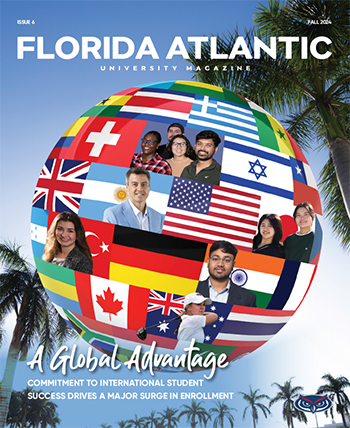11/23/2024
Florida Atlantic: Shine On
Solar Owls Use Sun to Soar at Texas Motor Speedway
As the temperature climbed toward 100 degrees in mid-July, a group of 26 Florida Atlantic University High School students were hoping for just one thing … more sun! That’s because the Florida Atlantic Solar Owls were gathered in Fort Worth, Texas, to compete in the 31st annual Solar Car Challenge at the Texas Motor Speedway.
Racing a car that we built on a NASCAR racetrack was a once-in-a-lifetime opportunity. The hard work that everyone put in during the past year contributed to our success on and off the track.”
– Mark Zagha, Team Captain
The Solar Owls were racing their ALSET Solar CyberSedan, which the students designed and built from the ground up over the course of a year at the Tech Runway facility in the Research Park at Florida Atlantic University.
Led by Allan Phipps, director of The Cane Institute at A.D. Henderson/FAU High, the Solar Owls spent a combined 20,000 hours designing, constructing and testing their CyberSedan. Nearly all the major materials used in the car were donated by sponsors, including items such as the battery pack and the carbon fiber frame.
“The Florida Atlantic Solar Owls consist of over 50 students from more than 12 different majors, united in their goal to innovate and apply their academic knowledge to address real-world challenges in the automotive and alternative energy sectors,” Phipps said. “I am incredibly proud of the entire team and all they have achieved in designing and building a fully functional, full-size fourseater solar cruiser. This car truly embodies the future of commuter vehicles, never needing to be plugged in to charge.”
Upon arriving in Fort Worth, the Solar Owls and 31 other teams were subjected to three days of scrutineering — rigorous evaluation by a panel of experienced judges — to ensure competing vehicles complied with technical and safety regulations. The teams that passed all inspections then took to the track for four days of racing.
The Solar Owls’ CyberSedan allowed for a driver and three passengers to traverse the 1½-mile track, home to an annual NASCAR race. Team members were seated on pit road to monitor the car’s performance, speed, battery life and various key indicators, with a few other team members in the stands as spotters to watch all activity across the speedway.
At the end of the grueling week of work and racing, the Solar Owls finished in second place in the Cruiser Division, which is defined as all cars featuring four passengers with the solar array integrated into the body of the vehicle. The Solar Owls were honored with the Lockheed Martin Award for demonstrating the highest level of engineering excellence. Earlier in the week, the Solar Owls received the Renda Carter Award presented for the outstanding team video and scrapbook, both of which summarized the team’s efforts designing and building the car.
“The experience was absolutely surreal,” said Mark Zagha, team captain and senior at FAU High. “Racing a car that we built on a NASCAR racetrack was a once-in-a-lifetime opportunity. The hard work that everyone put in during the past year contributed to our success on and off the track.”
The Solar Car Challenge was established in 1993 by educator Lehman Marks. The program is designed to help motivate students in the fields of science, technology and alternative energy.
This year’s event featured 32 teams from 12 states, with the Solar Owls becoming the first high school or university team from Florida to build a Cruiser Division car and ultimately compete in the race. A cross-country version of the race occurs biannually, with alternating years showcasing cars on the track at Texas Motor Speedway.
“This is the brain sport,” Marks said. “It’s not just about building the car, but how to drive that car, solve the inevitable problems that happen with the car, and keeping your team intact through four grueling days of racing. Doing the Solar Car Challenge makes these students better equipped to face the challenges they’ll have in life.”
For more information, email dorcommunications@fau.edu to connect with the Research Communication team.

